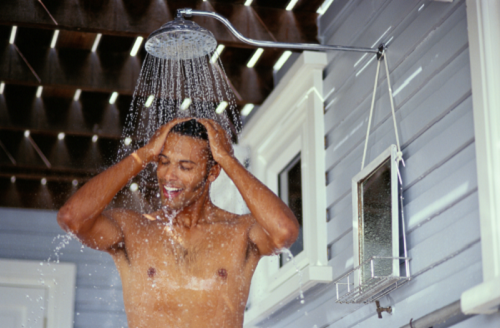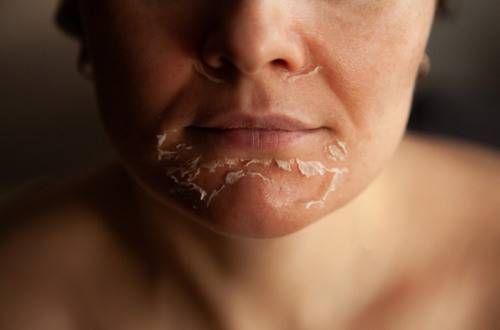You’ve recently noticed dry or peeling skin after showering, and you’re wondering what the cause is. It could be simple things like taking long, hot showers, or using harsh products, among other things. It’s important to note that experiencing dead skin after shower is quite common. But it can be an uncomfortable and itchy problem. This text highlights why dead skin rolls off after a shower. We will also cover everything you need to know about treating and preventing this condition.
Why Does Dead Skin Come Off After I Shower
Most people experience dead skin after shower, especially on the legs and arms. This is common because skin undergoes a natural process where it constantly forms, sheds, and replaces itself. The medical term for natural peeling skin is desquamation. This process happens every second, and in most cases, it’s not even noticeable as the dead skin cells fall off like dust. But sometimes, you may notice white dead skin after shower.
The second reason your skin may be peeling off after a shower is if you have dry skin. Dry skin is more susceptible to flaking, cracking, and peeling, which may be more noticeable after you shower.
Dead skin after shower may also result from a few showering mistakes. Taking a shower/bathing seems like a pretty straightforward thing. You turn on the tap, enter the shower, clean your body, and dry yourself. But each of these steps can affect your skin if not done properly. Here are some things in your shower routine that may be causing flaky dead skin cells.
Hot Showers

Nothing beats a hot shower to energize you in the morning or relax you at the end of the day. Unfortunately, how water strips away natural oils from your skin, leaving it dry, scaly, and flaky afterwards. The dryness encourages peeling from wet skin and other skin problems.
Excessive exposure to hot water can also dehydrate the outermost layer of the skin, thus leaving sunburn-like symptoms. Over time, hot water showers can damage the dermal layer of the skin, resulting in inflammation, redness, and peeling.
Taking Long Showers
Long showers intensify the above reason for skin becoming dry and flaky after a shower. The more time you spend in a shower or bathtub, the more your skin’s natural oils flush out. This can lead to eczema and other dry skin problems that result in skin peeling.
Too Much Soap
Most people use bathing soap, shower gels, shampoos, and the like when showering. The primary function of these items is to dissolve the oils and dirt on your body quickly so the water can wash them off. The more lather or bubbles these cleansers have, the more they strip your body of natural oils. This will result in dry, rough skin.
Using the Wrong Bathing Products
Certain bathing soaps and shower gels contain sulfate, parabens, fragrances, artificial color, and more ingredients that may be harsh to the skin. Using these products on your body for too long will irritate the skin and strip it of its natural oils, thus leaving it dry, rough, and flaky after a shower.
If you’re using bar soap, its high pH level may not fit the skin’s natural pH level. This mismatch might result in unpleasant skin reactions like dead skin cells after a shower.
Not Rinsing Properly
You’ve likely been out of the shower only to see soap bubbles on your back or behind your ears. Do you simply wipe it away? Dermatologists now warn that not rinsing soap can cause dryness and skin irritation.
As mentioned earlier, soaps dissolve skin oils, which are needed for protecting the skin. The result is dry, chapped, and vulnerable skin after a shower. That being said, it depends on the type of soap you’re using. Harsh cleansers left on the skin will irritate it. This is unlike gentle cleansers that may contain moisturizing properties.
Harsh Towel Use
Just as showering mistakes can cause dead skin after showering, the same is true for harshly drying your skin. Most of the time, we are in a hurry, and we rub the towel hard onto the skin to make it dry fast. Unfortunately, this causes friction, which irritates and damages the delicate post-shower skin and leaves it dry and peeling off.
Chlorine in the Water
We know that chlorine in swimming pools causes the skin to dry, but did you know this element is present in most shower waters? Those with sensitive skin or allergies are more susceptible to developing itchy skin after showering with chlorine water.
Skin or Health Condition
Certain skin conditions like atopic dermatitis (eczema) and aging skin can lead to dry, itchy skin. Damaged skin is also prone to infection and irritation. And this, together with the showering mistakes we’ve mentioned above, can leave you with dead skin cells after a shower. Certain medications, including statins and diuretics, will cause dehydration, thus leaving you with dry, peeling skin.
The best way to tackle this skin peeling problem is to treat the skin condition first. So, visit your healthcare provider or dermatologist for more guidance.
How to Get Rid of Dead Skin After Shower
No one wants to experience dry and peeling skin after a shower. Use the following tips to treat and prevent this condition from occurring:
Keep Your Showers and Baths Short
As mentioned earlier, too much water and soap exposure can harm the skin. Try to spend at most 10 minutes in the bathroom. This will ensure less damage to the skin’s moisture barrier and, in turn, prevent any dead skin cells from forming after a shower.
While you’re at it, shower sparingly. A daily shower is okay for most people, but 2-3 times a week is even better for maintaining skin health. Of course, it depends on your lifestyle. For instance, you may have to shower more often if you’re working out or engaging in sweaty activities. Still, they should be very short showers.
Use Lukewarm Water
Likewise, we recommend bathing with lukewarm water to prevent the damage often caused by hot water. Some people advocate for cold showers, but it has no benefit in protecting the skin barrier. In fact, cold showers may end up preventing your pores from opening, which is necessary for proper cleaning. So, stick to lukewarm or cooler showers.
Use Safe Products
If you experience dry skin and itchiness after a shower, it may be time to change your shower products. Go for the gentle, fragrance-free kinds to avoid skin problems. It’s essential to look at the ingredients list to ensure no possible allergens. And consider soaps and shower gels with a pH-balanced formula to help retain moisture while showering.
Use a Microfiber Towel to Pat Yourself Dry
How you dry off is just as important as how you bathe. Showering is abrasive enough. So, you want to pay attention to your skin afterwards because that’s when it’s vulnerable to damage. You must use a soft, clean towel to dab your body after a shower. This will prevent friction and irritation and keep the skin from over-drying.
Moisturize Immediately
Water evaporates the skin quickly after a shower or bath, leaving it dry and susceptible to peeling. You must use a lotion or cream moisturizer when the skin is still damp to help seal the much-needed moisture. Be sure to apply a generous amount, especially to the arms and legs, as they tend towards dryness.
Final Thoughts on Dead Skin After Shower
Having dead skin after shower is something no one wants to contend with. This condition is often a result of a particular showering habit or product that contributes to dry, flaky skin afterwards. Luckily, the tips above can help you reclaim your healthy-looking skin after enjoying your shower time.



